

The Positive Benefits of Creativity. Quick: Think of five things you could do with a new box of crayons.
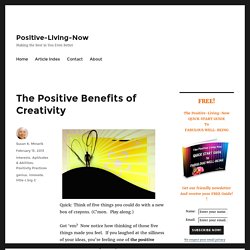
(C’mon. Play along.) Got ‘em? Now notice how thinking of those five things made you feel. If you laughed at the silliness of your ideas, you’re feeling one of the positive benefits of creativity—and you didn’t have to write a single sentence or draw a single line. Creativity comes in all shapes. In fact, it’s one kind of what’s called “everyday creativity” by the people who study the subject.
Everybody is Creative In his wonderful TED talk, “You’re a Lot More Creative than You Think,” internationally renowned fine artist John Paul Caponigro says “The human being is a creative species.” Business creativity consultant Dr. There’s no “best” way to be creative, she says. But her model is just that, a model. The only mistake you can make when it comes to creativity is to think that you don’t have any. The Benefits of Creativity Practicing creativity generates a lot of payoffs.
How to Boost Your Creativity Renew an old hobby. Seeing with Fresh Eyes: The Power of Curiosity. “I think, at a child’s birth, if a mother could ask a fairy godmother to endow it with the most useful gift, that gift would be curiosity.” ~ Eleanor Roosevelt If I could change Mrs.
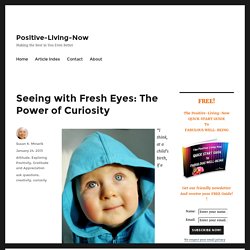
Roosevelt’s beautiful wish in one little way, I would insert the word “undying” before “curiosity.” Curiosity is a gift that we’re all given at birth. The trick is to keep it alive as we mature. Instead of seeing with fresh eyes, we see through a veil of memory and assumptions as we become familiar with the world. Positive psychology tells us that curiosity (along with gratitude, optimism, zest, and the ability to love and be loved) is one of the five character strengths that contribute most to our sense of life-satisfaction. And George Mason University psychology professor, Todd Kashdan, agrees. What Ever Happened to Open-Mindedness?
In a time when we seem to be sharply divided on almost every public issue, I often find myself wondering what ever happened to open-mindedness.
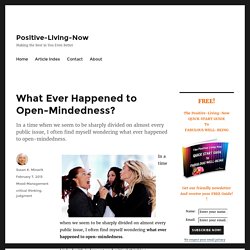
Linked with judgment and critical thinking, open-mindedness is one of the strengths measured by the VIA Inventory of Strengths, a free, scientifically validated self-assessment survey that’s been taken by over 1.3 million people worldwide. Let me tell you what I mean. My colleague Lisa is a passionately political person. You don’t need to spend much time with her to know exactly where she stands on the issues of the day. And in most cases, she’s standing on the other side of the fence from me. “I understand how you feel,” I tell her. It’s what we all want. The Love of Learning: Pass It On. In May of 2008, David McCullough, two-time winner of the Pulitzer Prize and recipient of the Presidential Medal of Freedom, gave the commencement address for the graduating students of Boston College.
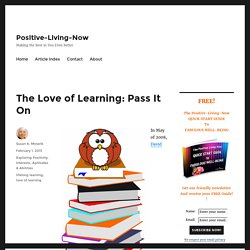
“For many of you of the graduating class,” he said, “the love of learning has already taken hold. For others it often happens later and often by surprise, as history has shown time and again. That’s part of the magic.” His own love of learning shines through his entire address, and I heartily encourage you to read it. The Positive Power of a Wise Perspective. You might have noticed, if you are a student of positive psychology, that I’m writing a series on the 24 Character Strengths identified by Martin Seligman and the late Chris Peterson, two of the founders of positive psychology.
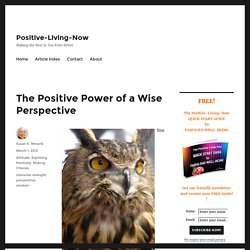
(You can find the earlier ones by clicking the “Articles Index” at the top of this page and then scrolling down to “Strengths, Individual.”) This week, I set out to give you some insight into the power of perspective, or wisdom. It turned out to be a bit of a daunting project. I started by looking at the description of the strength that accompanies the VIA Character Strength Survey itself. In its typical fortune-cookie fashion, it says: “Perspective (Wisdom): Although you may not think of yourself as wise, your friends hold this view of you. Creativity. Learning.
Curiosity. Philosophy.
The 5 Character Strengths of Wisdom in Positive Psychology. Our fascination with wisdom dates back for thousands of years.
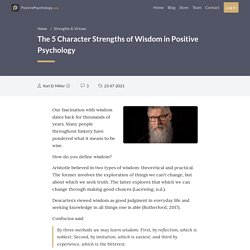
Many people throughout history have pondered what it means to be wise. How do you define wisdom? Aristotle believed in two types of wisdom: theoretical and practical. The former involves the exploration of things we can’t change, but about which we seek truth. The latter explores that which we can change through making good choices (Lacewing, n.d.).
Descartes’s viewed wisdom as good judgment in everyday life and seeking knowledge in all things one is able (Rutherford, 2017). Confucius said: By three methods we may learn wisdom: First, by reflection, which is noblest; Second, by imitation, which is easiest; and third by experience, which is the bitterest. Knowledge.